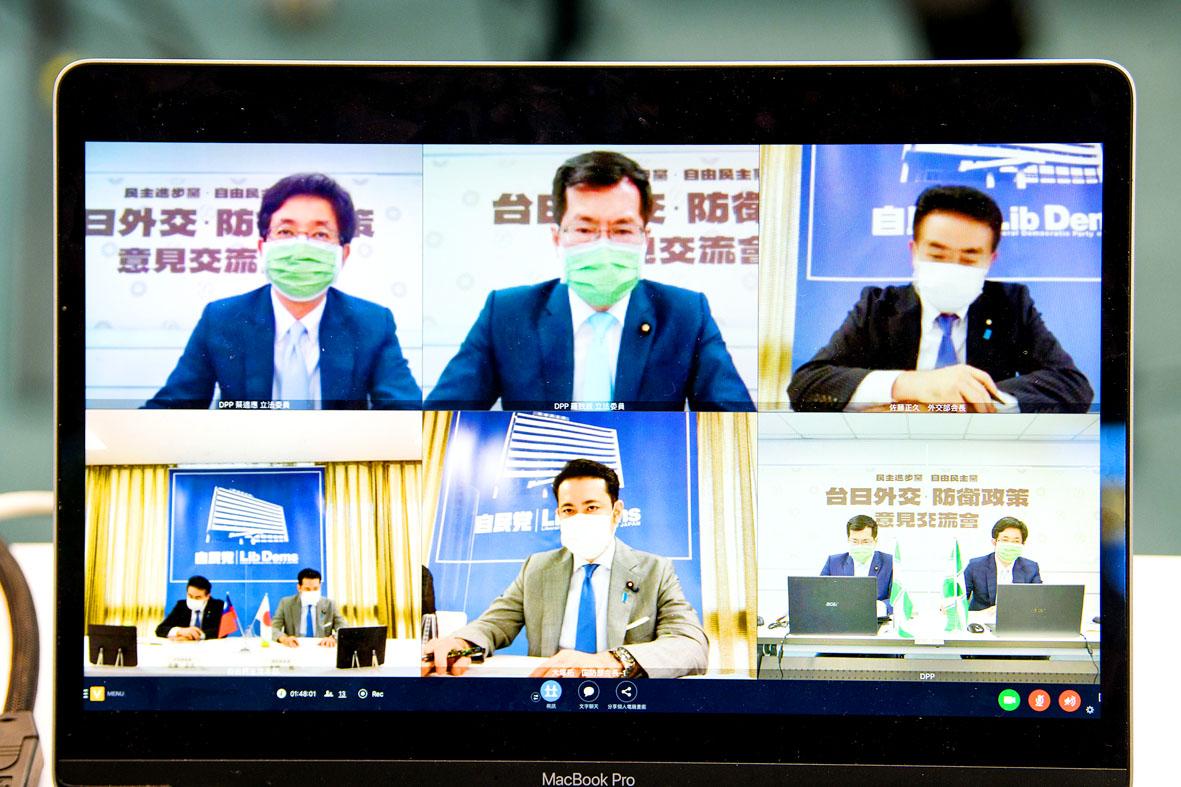The ruling parties of Taiwan and Japan yesterday held their first diplomatic and defense policy discussion, with representatives of Japan’s Liberal Democratic Party (LDP) pledging to support Taiwan’s bid to join the Comprehensive and Progressive Agreement for Trans-Pacific Partnership (CPTPP).
The 90-minute videoconference was attended by Lo Chih-cheng (羅致政) and Tsai Shih-ying (蔡適應) of the Democratic Progressive Party (DPP), with LDP Foreign Affairs division director Masahisa Sato and National Defense division director Taku Otsuka, DPP spokeswoman Hsieh Pei-fen (謝佩芬) said after the meeting.
The Japanese representatives asked Taipei to facilitate an investment by the Taiwanese semiconductor industry — especially Taiwan Semiconductor Manufacturing Co (台積電) — into the Japanese chip industry, Lo said.

Photo courtesy of the Democratic Progressive Party
The LDP representatives also pledged to back Taiwan’s bid to enter the CPTPP, as its participation in the organization is an important goal for Taiwan and regional partners, and would improve Taiwan-Japan relations, Lo said.
Both sides mentioned their concern over the presence of Chinese military vessels and aircraft in Japan’s southwestern and Taiwan’s northeastern sea zones, Tsai said.
Japan said it would invest a significant sum of the next fiscal year’s defense budget to bolster its air superiority in the region, while Taiwan said it would seek to increase its defense and take measures to secure its northeastern front, he said.
Both sides discussed military cooperation, which each said they would forward to their respective defense ministries, he said, adding that he could not comment on the specifics of the dialogue.
They also discussed the US’ resolve to support Taiwan’s defense, Lo added.
The party representatives also agreed to promote coast guard collaborations, Tsai said, adding that just before the meeting started, Sato wrote on Twitter, in Japanese, that “one day, the coast guards of Japan, Taiwan and the US will conduct joint training.”
While the issue of vaccines had not been brought up, Lo said that he had thanked the LDP and the Japanese government for donating vaccines to Taiwan, adding that it would deepen bilateral ties.
The Japan side said that its House of Councilors, the upper house of Japan’s Diet, in June introduced a motion to support Taiwan’s participation in the WHO as an observer.
In a separate comment to reporters after the meeting, Lo said that developing better Taiwan-Japan relations is backed by strong public support.
International affairs are changing, as many nations begin to express doubts about China, and Beijing’s bellicose attitude and military ambitions were among the many issues that led to the meeting, Lo said.
Sato said the dialogue would help inform the Japanese ruling party’s policymaking.
“The Taiwanese side said they had been waiting and hoping for such a dialogue ... [we both] felt it was significant to come up with common goals between the ruling parties that can lead to government policy for both countries,” Sato said.
China last week condemned the talks, saying that Japan should not send the “wrong signals” about Taiwan’s independence.
Lo brushed off China’s objections, saying it was expected.
“Taiwan, as a sovereign and independent country, has the right to promote bilateral and multilateral ties with all countries,” he said.
Additional reporting by Reuters and CNA

The Central Election Commission has amended election and recall regulations to require elected office candidates to provide proof that they have no Chinese citizenship, a Cabinet report said. The commission on Oct. 29 last year revised the Measures for the Permission of Family-based Residence, Long-term Residence and Settlement of People from the Mainland Area in the Taiwan Area (大陸地區人民在台灣地區依親居留長期居留或定居許可辦法), the Executive Yuan said in a report it submitted to the legislature for review. The revision requires Chinese citizens applying for permanent residency to submit notarial documents showing that they have lost their Chinese household record and have renounced — or have never

A magnitude 5.6 earthquake struck off the coast of Yilan County at 12:37pm today, with clear shaking felt across much of northern Taiwan. There were no immediate reports of damage. The epicenter of the quake was 16.9km east-southeast of Yilan County Hall offshore at a depth of 66.8km, Central Weather Administration (CWA) data showed. The maximum intensity registered at a 4 in Yilan County’s Nanao Township (南澳) on Taiwan’s seven-tier scale. Other parts of Yilan, as well as certain areas of Hualien County, Taipei, New Taipei City, Taoyuan, Hsinchu County, Taichung and Miaoli County, recorded intensities of 3. Residents of Yilan County and Taipei received

Taiwan has secured another breakthrough in fruit exports, with jujubes, dragon fruit and lychees approved for shipment to the EU, the Ministry of Agriculture said yesterday. The Animal and Plant Health Inspection Agency on Thursday received formal notification of the approval from the EU, the ministry said, adding that the decision was expected to expand Taiwanese fruit producers’ access to high-end European markets. Taiwan exported 126 tonnes of lychees last year, valued at US$1.48 million, with Japan accounting for 102 tonnes. Other export destinations included New Zealand, Hong Kong, the US and Australia, ministry data showed. Jujube exports totaled 103 tonnes, valued at

BIG SPENDERS: Foreign investors bought the most Taiwan equities since 2005, signaling confidence that an AI boom would continue to benefit chipmakers Taiwan Semiconductor Manufacturing Co’s (TSMC, 台積電) market capitalization swelled to US$2 trillion for the first time following a 4.25 percent rally in its American depositary receipts (ADR) overnight, putting the world’s biggest contract chipmaker sixth on the list of the world’s biggest companies by market capitalization, just behind Amazon.com Inc. The site CompaniesMarketcap.com ranked TSMC ahead of Saudi Aramco and Meta Platforms Inc. The Taiwanese company’s ADRs on Tuesday surged to US$385.75 on the New York Stock Exchange, as strong demand for artificial intelligence (AI) applications led to chip supply constraints and boost revenue growth to record-breaking levels. Each TSMC ADR represents